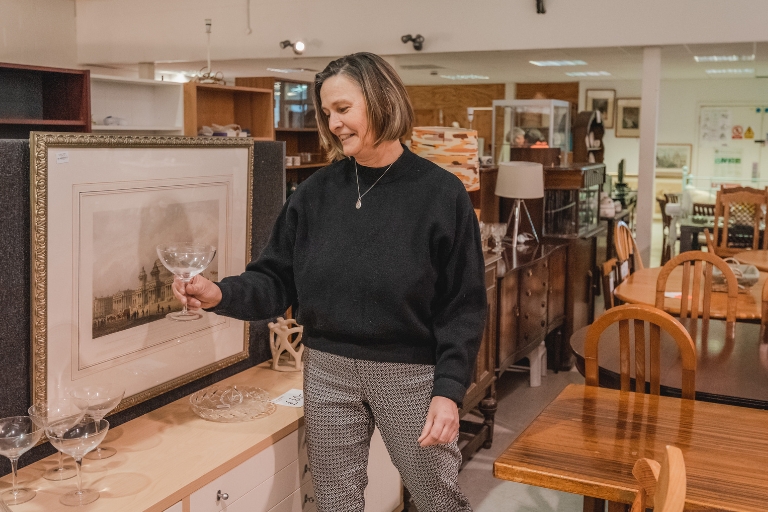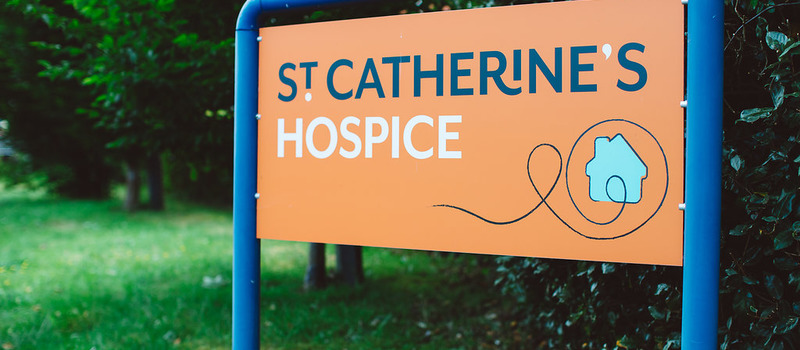“Don’t regret what you lost, embrace what you had”
We caught up with Robert a year on from the last time we spoke, following the death of his wife Caroline. To mark National Grief Awareness Week, which aims to raise awareness of all aspects of grief and loss on a national scale, Robert shares how he’s found living with his bereavement since then.
“It was a very good friend that told me how she’s noticed a change in my demeanour
She was staying with us during the awful existence we were living when Caroline was ill, but she’s noticed how I’ve changed as more time since Caroline died has gone on.
I’m living with my loss day to day
But my grief comes and goes. I’m at a stage now where I think I’m glad she’s dead because Caroline is out of pain and distress, and by the same token, so am I. During those last two months she was wishing for her death, we all were really. We were in dire straits. To manage her pain Caroline’s morphine doses were getting bigger and bigger and it’s not the way anyone wants to be. It was a terrible, terrible time.
When I think would I want her to spend any more time like that? The answer is always no.
While she was alive Caroline and I did a quiz that estimated how long we’d live
Hers came back at 81 and mine was 73 so we set our brains on that. When she died, she was 72 and I was 63, and for a little while I couldn’t stop thinking ‘this is so unfair, she should have had much longer.’
Now I’ve started to look at things in a different way and I feel I’m in a different place. Immediately after bereavement, you can often only think of your loss and the time you’ll never have with that person, but I think you feel the loss more when you don’t look at the positives. I can‘t deny Caroline peace or begrudge my loss because she’s not here for the future. If I spent all my time wishing she was I’d have inflicted pain on her, but this way she had release from pain, distress and discomfort.
I never shed a tear for the loss of Caroline and many times I thought that was wrong
Even during my loss, I couldn’t cry because Caroline had been released.
She had such excruciating pain. I couldn’t imagine her going through all that for another day. She lost her hair and was so upset she wouldn’t look at herself in the mirror, she had panic attacks and night terrors. A lot of my memories are the patterns of what cancer does and for Caroline there was never going to be any real escape from it apart from death.
I’ve realised that selfishness magnifies the feeling of grief, but it’s taken me time to get to that realisation
I never wanted to be alone and initially I wanted more time with Caroline but instead of focusing on what we’ve lost we have to think of our loved ones being free.
When someone first dies it’s such an intense time and emotions hit at the wrong time
I was feeling a mixture of emotions – grief, anxiety, regrets, depression. I kept thinking ‘I wish I could have done more, should I have done more?’ And that cycle went on until I began my counselling with the hospice. I found myself irate at what I didn’t do and thinking how my partner shouldn’t have died, there was a lot of anger.
I also found myself experiencing survivors’ guilt. In those early days you feel like the loss is your fault but in reality, it’s nothing to do with you. I could rationalise that, but it didn’t replace the guilt.
I found myself relying on the weekly phone call from Liz, the counsellor at St Catherine’s just so I could talk things through.
I just couldn’t compute losing Caroline. I’d been through grief before as I’d lost my father, mother and younger sister before Caroline, but this was something else.
I’ve started moving forward more now and things have started falling into place
The counselling I had with St Catherine’s was really valuable in helping me cope with my current situation, but it didn’t take me forward. I’ve had to do that for myself.
Now my counselling sessions have ended it’s nice to know that I can still call on the hospice if I ever need to again, it’s like a safety net. There’s been a few times I wondered ‘should I call?’ but I’ve been okay.
I’ve done lots of thinking since my counselling sessions came to an end, and my alteration in thinking is a combination of time and the bereavement counselling I had. It’s helped me get a better handle on what I’m doing.
I’m now able to reflect on how lucky I am that I had 37 years with ‘the one’
As Caroline was my one and only. 37 years is more than half my lifetime and I can’t ever lose that time. I had it with her in sickness, in health, through the good and bad times, the fun and difficult times. She truly loved me, and I loved her. She was always there for me and hopefully I was there for her.
I’ve now experienced all the first anniversaries without Caroline but the first anniversary of her death – 22 July 2021 was a real kick in the teeth
I went out for the day and had a real wobble as I was coming home. Later though I thought what the hell it’s just a date.
Last year I was also clinging to memories of Christmases’ with Caroline because the winter months were always her favourite, but I don’t feel that emptiness so much now. I’m alone but I’m not lonely. The firsts are difficult though.
If Christmas was important to the person who has died the first Christmas may be devastating. If they really enjoyed their birthday each year it might be difficult to feel good during the first one after they’ve gone.
I think it helps to map out in your mind a way to get past those landmarks, to work out how you’ll approach and interact with those days. If you don’t prepare, they can hit you in the face.
The first Christmas after Caroline died, I was on my own which worked for me at that time and the mood I was in. Last Christmas I had Caroline’s daughter and her boyfriend to stay. For Caroline’s birthday, the first year I really felt it, but I was out meeting people and working so I had a distraction. Her second birthday I went to the hairdressers.
In Spring 2021 I started tending to the garden and thinking about my future and how I can get back to work
I was drifting into a happy space just without Caroline. I still go for walks and talk to her, and I have memorials in the garden, she used to love primroses and bluebells so every time they flower I think of her.
I’ve previously described bereavement like a jigsaw
I’d like to say I’ve re-made the jigsaw, but I haven’t.
I’ve not settled on any sort of future for myself yet, but I want to continue working and to sell our house. Being back working gives me a good feeling. It helps me justify my existence and it’s nice to think I’m still a working member of society even if work is slow and steady.
My home is full of reminders too – everything has a bit of Caroline in it
I have so many vases, but I put roses and daffodils in them and place them in front of the bluebell wood scatter jar with Caroline’s ashes. I know I need to start sorting through our things, but everything has an emotional memory attached. That’s when things get tough, I think ‘I remember using that when’ when I see a certain napkin or tablecloth.
Grief will always stay but bereavement can be worked through
To try to work out my feelings I’ve kept a diary and it’s helped me fill in the blanks following my counselling. I do a line a day now and it’s helpful to look back and see how far I’ve come, because bereavement is a creeping thing.
Everyone has to find their own ways through it but I‘ve found my way by thinking about how I’ve had all my time with Caroline and rebuilding from there.
I think of it as a ditch. You fall into the ditch when you lose someone, but you can either get outside on the side you fell from, where you’re feeling deprived of future years with the person you love, or you can get out on the other side where you have your memories, you know that person will be yours forever but you realise you need to rebuild.
Sometimes I’m tempted to try to reconstruct the jigsaw I made with Caroline but then I catch myself and think no, I don’t need it, because jigsaws require a history. Now I draw a finite line and focus on what I had and how great it was instead of what I’ve lost.
When you rebuild or find a way forward it doesn’t mean you have to forget the person who has died either
I started writing stories to Caroline after her death and I’ve written her at least 22 letters. One was about how we were stuck in a traffic jam after one of her chemo appointments. They share bits and pieces from the 18 months of her illness, but they focus on us. One day I suddenly thought ‘what am I doing? I’m reinforcing my grief by writing those letters and reliving those times.’
Instead, now I often walk the same routes we walked together including the South Downs walk which was her last walk and one of the best memories during those awful months of her illness. I remember we took a walking stick chair with us so she could sit down whenever she needed to, rest her legs and catch her breath, while enjoying the view. When I walk round now, I talk to her and it’s like reliving those moments with her. I occasionally talk to her and keep her up-to-date at home as well, as while she was ill we were in the house together 24/7. Moments like these make me feel like I’m creating a roadmap to rebuilding.
What was important to the person you love doesn’t have to be important to you, but you can try and honour the things they enjoyed and loved too
For example, the roses in our garden were Caroline’s pride and joy so I’ve kept tending them so each year so I have a display.
I don’t feel qualified to give anyone advice because grief and bereavement is different for us all but “don’t regret what you lost, embrace what you had” is how I’ve coped. I like to think I’m moving forward with that approach. Our time with the people we love is finite and none of us have been cheated when they die.
The things I learnt from my counselling with the hospice still resonate with me a year on. I think it set me on this path and has made things easier to get to where I am now.
It’s true that time heals but it will only heal with your help.”

If you have had a loved one under the care of St Catherine’s and think you would benefit from bereavement support please take a look to see the different ways we and other organisations can offer you support.












